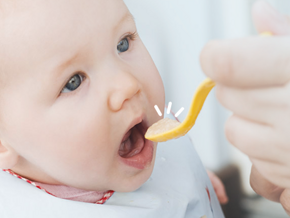
Baby Meal Planner 6 to 8 Months
Baby Meal Planner 6 to 8 Months
After baby has started on solid foods, start experimenting with soft lumps and bumpy foods. The lumps help your baby to develop chewing skills and develop tongue strength which can assist with speech development.
Consistency: Mashed foods with soft lumps as tolerated, progressing to minced and chopped foods.
Amount: 1/4 to 1/2 cup plus
Timing: After breast feeds
Breast feeds: 3–5 breastfeeds per day
Frequency: 2–3 times a day
Types of foods: Increase variety of foods - cereal (grain foods), different fruits and vegetables, as well as whole egg, custards and yoghurts
Check out our recipes for babies from 6 months.
Note – Always seek individualised advice when you have a family history of allergy, intolerance, coeliac disease or your baby is suspected to have feeding delays (such as tongue tie or physical or mental disabilities).
Related articles

Breastfeeding Snacks
Breastfeeding is a rewarding but demanding journey, and good nutrition is crucial for both you and your baby.
8 mins to read

Warming Baby Formula
There may not be many situations where you will need to warm up a formula feed, but on the odd occasion when you do it’s important to know how to do it safely.
2 mins to read

Formula For Newborn Babies
Baby formula is usually split up into two categories according to your babys age.
2 mins to read

Baby Formula Feeding Concerns
Most formula fed babies will be very happy on the baby formula you first choose. However, it’s important to know that not all formulas suit all babies.
7 mins to read

Special Baby Formulas
Formulas for lactose intolerance, regurgitation, and allergy management are some of the infant formulas available for formula fed babies with special dietary needs.
4 mins to read

How to Prepare Baby Formula
Safe preparation of baby formula is important for your baby’s health. Like any food preparation we need to consider good food hygiene practices - it doesn't need to be complicated.
5 mins to read

What Information Can Baby Formula Companies Provide?
Manufacturers and importers of infant formula, otherwise known as baby formula, may be bound to some very important codes of marketing and advertising.
2 mins to read

Guide to Baby Formula
Explore our guide to baby formula and learn more about the difference between newborn formula and stage 2 formula.
5 mins to read

The Importance of Iron for Babies
An Australian nutrition survey showed that 75% of infants aged 6-12 months were not consuming enough iron.
5 mins to read

Baby Formula Ingredients
Baby formulas will never be equal to breast milk, however they have been formulated to provide the necessary nutrients to support normal growth and development when breast milk is not available.&nb
4 mins to read

What Support is Available If I've Decided to Formula Feed
There are many parents out there just like you, who have for whatever reason, decided not to breastfeed, and given this is to be an unlikely easy decision, it’s important to know what support is th
2 mins to read

Transitioning Between Different Milk Feeding Options
Whether you’re moving from breastfeeding to formula feeding, or changing from one formula to another, it’s important to keep your eye out for signs of intolerance.
2 mins to read

10 Ways to Introduce Variety and Texture
Help your six to nine-month-old set up healthy eating patterns by offering a wide variety of flavours and textures now.
5 mins to read

Mini Meals For Mini People
Focus on your baby’s nutrition by offering smart 'mini meals' in between traditional mealtimes. Focus on age appropriate texture and nutrient rich options.
4 mins to read

Your 6 to 12 Month Old’s Hunger & Fullness Cues
Is your hungry baby eating enough? Here are some hunger and fullness cues to watch out for in babies sitting up.
3 mins to read

Make Every Bite Count For Baby’s Growth and Development
Starting your little one on solid foods is quite a milestone!
3 mins to read

Baby Nutrition - Mini Meals For Mini People
The dietary needs for infants during the first year of life are higher than those of adults.
5 mins to read

Baby’s Evolving Needs
Around six months of age, baby’s evolving needs call for the introduction of appropriate complementary foods.
1 min to read

Baby-led Weaning Checklist
Most babies start solid foods at around 6 months. Baby-led weaning, where your baby feeds themself finger foods, is a way to help them discover new flavours and textures at their own pace.
3 mins to read